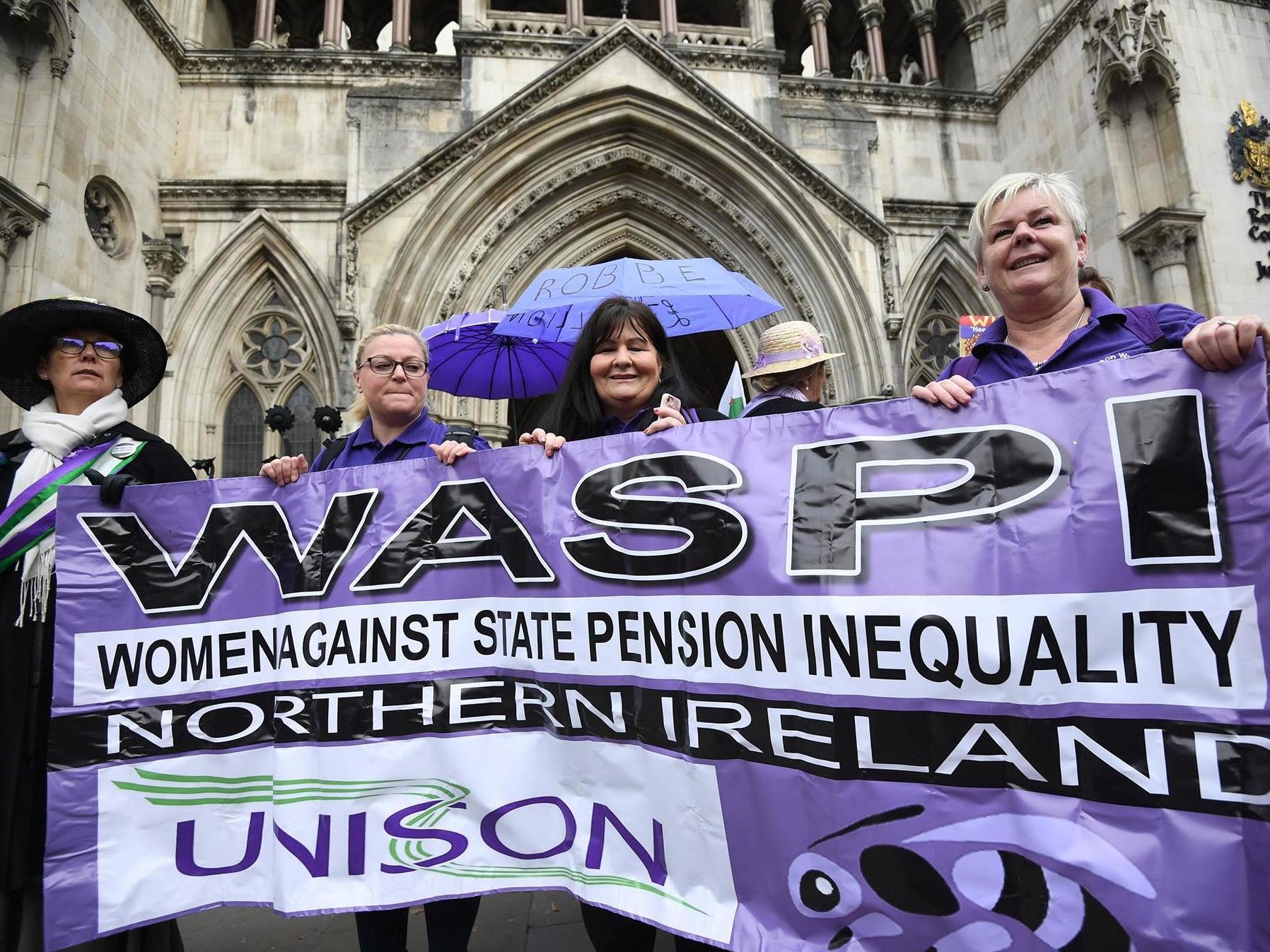Rishi Sunak urged to confirm compensation for pension victims as fiasco set to cost taxpayer up to £10.5bn
Damning watchdog report tells government it must compensate women who were not warned that their pensionable age was changing from 60 to 65 – but No 10 refuses to confirm payouts

Rishi Sunak is being urged to set aside billions of pounds to compensate women whose lives were “ruined” by government failures relating to changes in the state pension age.
A damning report has said that the affected women, born in the 1950s, should be offered an apology and payouts of between £1,000 and £2,950, after changes to the age at which they would be eligible to draw a state pension were not communicated properly, plunging their retirement plans into chaos.
The scathing 100-page report, published by the Parliamentary and Health Service Ombudsman (PHSO), criticised the government for its handling of the change in the pensionable age from 60 to 65, accusing it of failing to acknowledge its error or to put things right for those affected.
But Downing Street has so far refused to commit to paying compensation, which the watchdog said could cost the government up to £10.5bn based on the recommended payouts.
MPs from across the political divide have urged the government to swiftly set up a compensation scheme, with some echoing the call of campaigners that the figure should be at least £10,000 per person.

The ombudsman also said that the DWP had indicated it would not comply with the recommendation, a stance that the PHSO deemed “unacceptable”. As a result, the PHSO said it was taking the “rare but necessary step” of asking MPs to intervene.
Women Against State Pension Inequality (Waspi) chair Angela Madden said there are parallels with other scandals in recent years, such as the Post Office and Windrush, and urged the government to “put their money where their mouth is”.
Appealing to Mr Sunak directly, and suggesting he put £36bn aside to allow for a higher payout for more women, she said: “I would ask him to do the right thing ... and actually compensate us properly.
“His government and previous governments have caused great harm to Waspi women. They’ve ruined our lives. It’s worth a heck of a lot more than one or two grand.”
Senior Tory Peter Aldous, co-chair of the all-party parliamentary group (APPG) on state pension inequality for women, also backed the £10,000 figure, adding: “These millions of women worked, cared for families, and supported communities all their lives. They deserve the dignity of fast compensation.”
Labour MP Rebecca Long-Bailey, the chair of the APPG, added: “The government must right this historic wrong, and go beyond the recommendations of the Parliamentary and Health Service Ombudsman and deliver fair compensation to these women as a matter of urgency.”

Conservative peer Ros Altmann, a former pensions minister, called for parliament to decide “what, if any, blanket compensation is offered and whether there will be a scheme that those worst affected can claim from on a case-by-case basis”.
Fellow former pensions minister Steve Webb also urged parliament to act, saying: “There is no point in parliament having an ombudsman if the government ignores its carefully considered recommendations.”
One Waspi campaigner added: “If it is £3,000, I’ve spent more than that on banners and train tickets to go to protests.”
Work and pensions secretary Mel Stride is likely to appear in the House of Commons before the Easter recess to address the ombudsman’s recommendations, Commons leader Penny Mordaunt suggested.
Both the DWP and the prime minister’s official spokesperson said the government will consider the ombudsman’s report and respond to its recommendations formally “in due course”.
The government is under no obligation to follow the recommendations.
Waspi campaigners claim that millions of women had their retirement plans “plunged into chaos”, with many being left thousands of pounds out of pocket and more than 250,000 estimated to have died before receiving compensation. Some say they had to use food banks or sell their homes in order to survive.
The watchdog’s report detailed how women suffered stress and anxiety, with many forced to “deplete” their savings, as a result of the government’s mishandling of the changes, which were introduced under the 1995 Pensions Act and raised the state pension age for women born on or after 6 April 1950.
It found that thousands of women may have been affected by the failure in communication.
PHSO chief executive Rebecca Hilsenrath said: “The UK’s national ombudsman has made a finding of failings by the DWP in this case, and has ruled that the women affected are owed compensation.
“The DWP has clearly indicated that it will refuse to comply. This is unacceptable. The department must do the right thing and it must be held to account for failure to do so. Complainants should not have to wait and see whether the DWP will take action to rectify its failings.”
The number of women who could be in line for compensation is unclear. The report said that compensating all 3.5 million-plus women born in the 1950s would cost anywhere between £3.5bn and £10.5bn.

It noted that not all of them would qualify, but that there were likely to be a “significant number of women born in the 1950s” who had “suffered injustice because of maladministration”. Campaigners say 2.4 million women were affected by the change to the pensionable age.
Debbie de Spon, communications director for the Waspi campaign, is among those who were affected and claims that she lost around £26,000 in state pension payments.
She told The Independent: “When you don’t have your disposable income, it limits the choices you make, the Christmas presents you buy, the holiday you choose, the way you spend your time. We all have budgets to live to, and if your budget is limited, you cut your coat to your cloth, which is what I did.”
The impact on some other women was much greater, she said. Many faced severe difficulties in their financial planning, because wills left by their husbands, or divorce settlements, had been drawn up on the premise that they would receive a state pension from the age of 60.
Some, Ms De Spon said, were forced to sell their homes or spend their retirement savings, leaving them worse off when they eventually received their pensions. A large number are now fully dependent on their children for financial help.
She added: “One woman wrote to us and said, ‘My children hope they stay well enough to support me as I can’t pay my bills.’ Another said, ‘I had to lose my home because I couldn’t pay the mortgage.’ ‘I’m desperate, what can I do?’ they say.”
Some did try to find new work, but because of their age they struggled, said Ms De Spon, with many taking on unsuitable work just to keep an income. One woman, in her sixties, worked as a cleaner on an offshore oil rig, she said. Other women, she said, had taken painkillers to keep on working in roles that they found physically strenuous.
One woman told the ombudsman she had suffered a financial loss of £39,000. Another said she had lost around £45,000 because she had reached the state pension age six years later than expected.
The report also mentioned Ms E, who claimed she had lost around £186,000 in potential work that she may have found had she been correctly informed about the age increase. Another said she had lost more than £442,000 in additional pay she would have received had she stayed in her job.
And another woman, Ms I, told the ombudsman her savings had been “depleted” and that she had grappled with a “great deal of stress” that had caused her physical symptoms including chest pain.
While the consideration of any “direct financial loss” as a result of the change in the state pension age was not in the ombudsman’s remit, Ms Hilsenrath said, she told BBC Radio 4 that it had found that the women had experienced an “indirect financial loss” as a result of the “poor communication” of the government.

She said: “We were looking at the impact of poor communication. And what we found was it resulted in a lack of financial autonomy, a lack of the ability to make informed decisions about people’s plans for their retirement.”
The ombudsman investigated complaints that, since 1995, the DWP had “failed to provide accurate, adequate and timely information about areas of state pension reform”.
It found that the DWP had failed to provide “accurate, adequate and timely information” to those affected by the state pension age changes, and that the department had omitted to “offer any apology or explanation for its failings and has indicated it will not compensate women affected by its failure”.
It added that the DWP’s “handling of the changes” meant that “some women lost opportunities to make informed decisions about their finances. It diminished their sense of personal autonomy and financial control,” it said.
The ombudsman has been investigating the issue for five years, with the first stage of its report, published in 2021, finding that the government had been slow in informing women of how they would be affected by the change.
Join our commenting forum
Join thought-provoking conversations, follow other Independent readers and see their replies
Comments